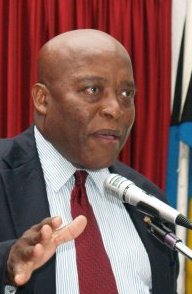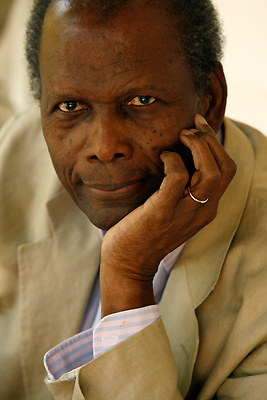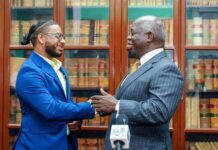Oswald Brown Writes!

By OSWALD T. BROWN
“It is better to be thought a fool than to open one’s mouth and remove all doubt.” The truth inherent in this sage axiom currently is being proven in a number of posts on Facebook in response to the decision by the Progressive Liberal Party (PLP) government to rename the Paradise Island Bridge in honour of Sir Sidney Poitier, the internationally acclaimed Bahamian-American actor, to launch the activities being put in place for 40th anniversary celebrations of The Bahamas’ attainment of independence.
Virtually all of the comments that have been posted so far have been very critical of the government’s decision. One person even asked this stupid question: “Other than being Bahamian what has Sidney Poitier done for The Bahamas?”
Young persons who never developed a love for reading can be forgiven for not being aware of the immense contributions made to this country by arguably The Bahamas’ most famous “son,” but there are some surprisingly negative comments from some older persons who should know better and most certainly should be aware of the significant role Sir Sidney played in The Bahamas’ struggle for majority rule in the 1960s.
What many Bahamians tend to forget is that the struggle by black Bahamians against racism and for equal rights in this country was waged simultaneously with the civil rights struggle in the United States, where racism was sanction by law. Sir Sidney was actually born in Miami, Florida, and as an American citizen by birth he was one of the celebrity activists very much involved in the American civil rights struggle, working alongside Dr. Martin Luther King, Jr. and other civil rights leaders in the United States in the 1960s.
But he never forgot his Bahamian “roots.” How could he? He was just a few months old when his parents, Reginald and Evelyn Poitier, returned to Cat Island from Miami, and Sidney spent his boyhood days in The Bahamas. The remarkable story of how he became one of the world’s greatest actors has been well documented. As noted in Wikipedia, the Internet online encyclopaedia, at the age of 10, his family moved to New Providence from Cat Island and the age of 15 was sent back to Miami to live with his brother. Subsequently, he moved to New York at the age of 17 and held “a string of jobs as a dishwasher.” The rest of the life story of this remarkable Bahamian-American is template for achieving success through sheer grit and determination to succeed in his chosen profession.
What has Sir Sidney done for The Bahamas? During his involvement with civil rights movement in the United States in the 1960s, it was well known at the time that Sir Sidney used his celebrity status to focus attention on the concomitant struggle for equal rights and to stamp out racism in The Bahamas.
This was around the time when his acting career was in “high gear.” I recall that I was a young reporter at The Tribune when he became the first black person to win an Academy Award for Best Actor for his role in “Lilies of the Field” in 1963, and I covered the gala dinner held in his honour at the British Colonial Hotel following a massive welcome-home motorcade through the streets of Nassau.

It is important to keep in mind that the United Bahamian Party (UBP) was the then government, and although I can’t quote verbatim any portion of the powerful speech Sir Sidney delivered in thanking the UBP for honouring him so lavishly, I do remember how proud I was listening to my “black brother” talk about the evils of racism and its undesirable existence in The Bahamas. Surely, this national recognition by the UBP of Sir Sidney’s accomplishment as an actor, just a year or so after the Savoy Theatre on Bay Street had been integrated, must have stoked the simmering embers of discontent among politically active young blacks involved in the “quiet revolution” and helped bring about the downfall of the UBP in the historic January 10, 1967, general election.
Obviously, Sir Sidney was very pleased with the outcome of that election because he was present at the opening of the House following the election along with several of his celebrity friends, including Bill Cosby, Sammy Davis Jr., and Clarence Williams III, one of the stars of The Mod Squad, one of the top-rated television shows in 1967.
This was also the year when Sir Sidney became the movie industry’s Top Box Office star of the Year with three successful films: To Sir, with Love; In the Heat of the Night; and Guess Who’s Coming to Dinner.
Given this fact, Sidney Poitier’s name and accomplishments are known in every corner of the world and I am sure that he’s recognized primarily as a great Bahamian actor. To be sure, it is impossible to put a “dollar value” on what this has meant to a tourist destination like The Bahamas.
So let me congratulate my good friend Charles Carter and Dr. Nicollette Bethel, co-chairs of the Bahamas’ 40th Independence Anniversary Steering Committee, for recognizing someone who is indeed well deserving of such a high honour for his invaluable contributions to this country.








We cannot ignore the part played in the struggle for Majority Rule by Sir Sydney Poitier. However, it is my view that he could have done something more tangible to pass on his talent to the younger generation in the form of a “Sir Sydney Poitier Theatre” that would enable many nother Bahamians to achieve success as he has.
Mr. Brown, people are not ignorant because they voice an opinion. The truth is, we would have more respect for Sir Sydney if he had passed on his talent to our people and give less fortunate Bahamians a hands-up.
Lana, You were most respectful in your response to the article by Oswald Brown. I commend your as we wont want to affront others. I like you and surprisingly a large body of people feel that Sir Sydney Poitier is a remarkable Bahamian and Man of the world. However as the song says “What have you done for me lately”. w
How come we as the people have to build this drama and Theatrical site and name it after him. With the links this brother had and from the time he had those links he could have done that as a donation of continued goodwill and love. He could have gotten all this without paying a dime! Bahamians would have been able to have harnessed a heel of the activity that goes into Theatrical and the performing Arts. How many Bahamian kids has he exposed to high quality drama and the technical areas to produce such Art? So yes Im proud to know of his association with the Bahamas and in truth his strength in moral character to have expressed himself at that UBP celebration I cant say he is my Local Hero.And i dare say many other Bahamians. Having said that as a child he was my idol, and by chance i had made to meet him in Nassau as a child but i left the Island during that Summer. Finally has anyone ever ask Sir Sydney if he is a Bahamian? Listen to his answer….very interesting response
I agree whole heartily with Lana.
The hoarding of experience, know how and information, the almost loathsome disconnect and contempt, MOST older and suscfull Bahamians have for the trailing generation, are common place in our society. Mr. Poitier, is just another one, who has done the same.
Think about it. How many Bahamians, who “got over”, have tried to pull others over to the bright side they are on? How many have invested into programs, and assistance opportunities for some of the less fortunate in their perspective fields?
I hope and pray for the day, when more of us will realize, what we do in our present, will foster a better future, or one far worse, than we had. Most important, if we do the latter, it will be OUR children and grandchildren, who will be living in it.
In short, most Bahamians are selfish and once they have achieved success, they hold on to ALL that made it posable for them to become as such. Rather than passing it on, so others can benefit, after they are gone, they cling on to their treasure chest of brain and practical wealth, as if they will have use of them in their graves.
Search out the country to see how many persons such as Mr. Poitier and his kind, have understudies from our inner cities and family islands who are not their relatives, or the offspring of one of their kind. We do not look back, pull up and lift up others and most of us only care and feel, for our own.
So said Stone McEwan
Comments are closed.